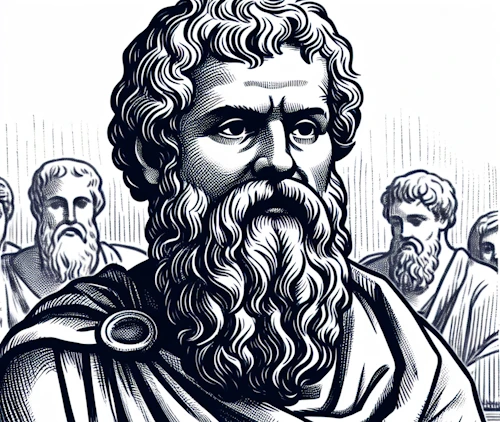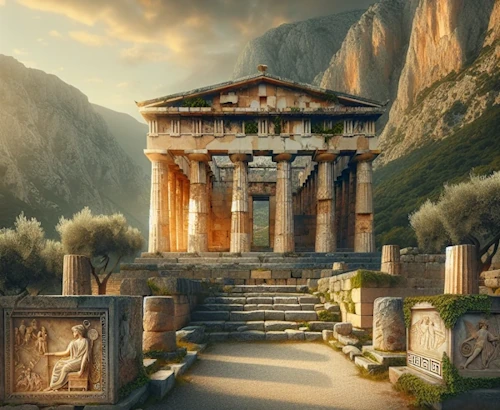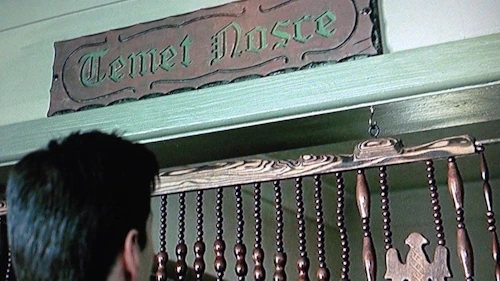
You can read it in the header of this website because it is our motto and most likely you have encountered it hundreds of times before: “Gnōthi Seauton“, translated into English as “Know Thyself“. But what is its origin and what does it intrinsically mean?
The Delphic Oracle
This epigram was engraved on the entrance to the temple of Apollo at Delphi, a Greek city on the slopes of Mount Parnassus. It was home to the most prestigious Oracle of antiquity, where the Pythias, priestesses of Delphi, gave answers to those who questioned them. The maxim “Gnōthi Seauton” urged visitors to introspection, to explore their own consciousness, to seek the answers within themselves and not outside.
Socrates: The luminary of ancient greek philosophy
Numerous thinkers were inspired by this aphorism, including Socrates, the emblem of ancient philosophy. According to him, the search for truth, which dwells in man, is possible only by looking within and above all by conversing with oneself and others. Out of dialogue comes analysis, which has no definite goal as each answer is followed by a further question: doubt is the key to evolving and learning. Socratic maieutics was the dialogue-based method by which the philosopher helped his interlocutor search for truth.

The importance of dialogue for Socrates
Socrates left nothing written because he thought philosophy should be practiced through orality; philosophical discussion had to be continuous and could not admit a conclusive point as writing allowed. His ideas were passed on by his disciples, such as Plato and Xenophon.
Plato: from disciple to great philosopher
Plato also gave priority to the verbal aspect, but he felt the need to leave a trace of his theories and those of his master. For this reason he wrote meticulously, especially dialogues, in which Socrates was the protagonist; in this way it was possible to preserve fundamental elements such as alternating theses and dialectics. Plato gave birth to a unique philosophical thought that still forms the basis of Western culture today and inspires numerous scholars. Platonism is an all-round philosophy illustrated by the author mainly through myths, such as the myth of the cave, the myth of the winged chariot, the myth of Er.
The interpretation of the Oracle’s response
Cherephon, a companion of Socrates, once consulted the Oracle of Delphi and asked if there was anyone wiser than his dear friend. The Oracle’s answer was negative, indicating that no one possessed greater wisdom than Socrates. This fact then triggered in the philosopher a deep speculative quest. Socrates was known for his modesty, to the point of making a statement that still arouses interest and debate today, “I know that I know nothing“. The Oracle thus seemed to mean, in paradoxical terms, that he who knows that he does not know is actually the wisest of all.
Socrates’ quest for wisdom
Socrates, following the Oracle’s response, set out on a path of inquiry aimed at unraveling the innermost meaning of those words and grasping the truest meaning of knowledge, holding conversations with everyone he met in Athens in the hope of finding someone wiser than himself. However, his efforts were in vain, for he found that although many professed to be wise, their understanding of things was superficial and moreover they were unaware of their own lack of knowledge.

The realization of self-knowledge
Through his exploratory journey, he came to understand that true wisdom is found in being self-aware. He recognized that his own ignorance made him wiser than those who thought they knew so much and boasted about it. This awareness became the foundation of “Nosce te ipsum“, which emphasizes the importance of self-knowledge and introspection.
The Ancient Romans and Stoicism
The Latins were fascinated by the powerful Greek culture and assimilated those aspects that they lacked. They inherited philosophical thought and translated the adage from the Oracle of Delphi as “Nosce Te Ipsum” or even “Temet Nosce“.
They revived some currents such as Stoicism, of which Seneca and Emperor Marcus Aurelius were two great exponents. The latter in particular argued that inner inquiry was fundamental to taking care of one’s soul and trying to live virtuously.
Nosce Te Ipsum in Christianity
Some Christian theologians also reworked the thinking behind this principle. Bishop Gregory of Nyssa argued that through seeking ourselves we can find the light of God; the dialogue, according to him, had to be with God, because a spiritual life lived in encounter with the Most High would become luminous not only for oneself but also for others.
Nosce Te Ipsum in literature and popular culture
In modern times this maxim is as relevant as ever. Philosophers such as Plato, Juvenal, Hegel, Fichte, and even more recent thinkers have deepened the idea, attributing to it great ethical significance and a truth that applies universally.
Many books and films are based on it, a famous example being the film The Matrix in which a sign reading “Temet Nosce” appears before the protagonist Neo crosses the threshold of the Oracle. A Pythia of Delphi in a modern key, perhaps? In addition, there are disciplines today that propose self-knowledge through meditation or other practices.

What does Gnōthi Seauton mean?
After this historical excursus, all that remains is to delve into the true essence of this adage. Self-knowledge begins, just as Socrates said, with the search for truth that can only be found within ourselves.
Society and human well-being
The society in which we live is frenetic and competitive and pushes us in the opposite direction, that is, to keep our deeper thoughts away by diverting our attention to doing and measuring ourselves against others on a merely material and pragmatic level. Sometimes we blame external factors for our discomfort, but is it really so? Isn’t it that maybe we already know the solution deep in our soul? Maybe we should just take a few moments to consciously look within ourselves and why not, with the help of a professional if needed.
The dual and consumerist world
Today’s world is immersed in duality, which imposes on us a vision based on opposing elements, such as good-evil, beauty-ugliness, useful-useless. Normally the mass media channel our thoughts and wills, pushing us in one direction today and perhaps in the opposite direction tomorrow, preventing us from freely choosing what is most akin to our true essence. Consumerism and the accumulation of money lead us to dissatisfaction and the constant search for new needs, but this causes a conflict in our deepest part, the soul, which reminds us that we are part of a Whole in close interconnection with the universe.
One, No One, and One Hundred Thousand
Investigating our own consciousness allows us to learn not only to know and accept ourselves, but also to reunite our core elements, namely body, soul, mind and spirit, into a single entity. As much as in daily life we are accustomed to wearing masks, letting people know a hundred thousand versions of ourselves, we need to remember that we are actually human beings characterized by a unique and inimitable personality; just like truth, which is only one; while lies can take infinite forms.
How we put our motto into practice
This is the spirit that motivated the staff to create The Spiritual Seek. We have developed various types of tests, some of which investigate and detail particular aspects of the user’s personality, while others assess the user’s degree of spiritual mastery. This is because we believe that a person’s essence cannot be considered only on the basis of practical and earthly aspects, but also on the basis of the more authentic as well as transcendental ones.
If you answer our questions in a truly sincere way, without thinking about what might be politically correct or what others would say, you will be able to glimpse new facets of your being and receive insights to improve and perhaps even begin to live a deeper and more intense life.
Introspection for getting to know oneself
We hope to stimulate people who visit our website to embark on a path of awakening and awareness in search of the truth that resides within them. Just like modern Socrates, through the tests, we want to establish a dialogue with them to make them reflect on those aspects they take for granted or those they have never thought about. We like to think that users, while answering our questions, are conversing with us and getting to know themselves better, just as Socrates did with his fellow citizens on the streets of ancient Athens, reminding them that: “Let him who would move the world, first move himself“.
Now that you know the origins of our motto, all you have to do is getting to know yourself better by taking our sophisticated personality tests, created with great professionalism always keeping in mind the teachings of timeless masters of thought like Socrates.
TAKE THE AWARENESS TEST
TAKE THE GREAT PERSONALITY TEST
MINI SELF-ADMINISTERED TEST: DO YOU HAVE A PHILOSOPHICAL MIND?
Read the sentences below and select the ones you agree with and that you think make the most sense.
Count the number of boxes checked and read the corresponding profile.
0: Your mind is anti-philosophical
1-2: Your mind is unphilosophical
3-4: Your mind is prone to philosophy
5-6: You are a true philosopher
MINI SELF-ASSESSMENT TEST: DO YOU LIVE IN THE PLATONIC CAVE?
Read the sentences below and select the ones you agree with and that you think make the most sense.
Count the number of boxes checked and read the corresponding profile.
0: You escaped from the cave
1-2: You are almost out of the cave
3-4: You live in the cave but at times you find it uncomfortable
5-6: You live in the cave and you like it very much
